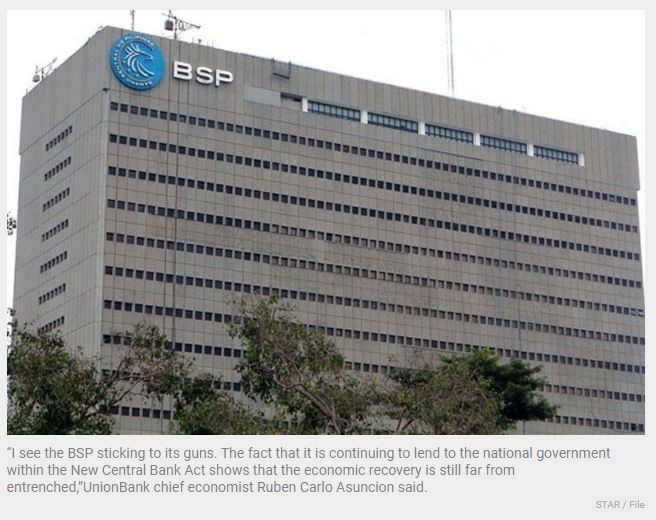Philippines: BSP seen keeping rates on hold
MANILA, Philippines — Economists are not expecting a surprise on Thursday as the Bangko Sentral ng Pilipinas (BSP) is likely to keep interest rates at record lows to help the economy fully recover from the pandemic-induced recession.
UnionBank chief economist Ruben Carlo Asuncion said the Monetary Board may keep policy rates on hold during its last rate-setting meeting for this year scheduled on Dec. 16, as the Philippines has yet to fully recover from the impact of the pandemic.
“I see the BSP sticking to its guns. The fact that it is continuing to lend to the national government within the New Central Bank Act shows that the economic recovery is still far from entrenched,” Asuncion said.
The Department of Finance (DOF) earlier announced that it would borrow P300 billion from the BSP, lower than the recurring P540 billion provisional advances, amid improved economic conditions.
The national government borrows from offshore and onshore creditors, including the central bank to finance its COVID response measures.
The Philippines exited the pandemic-induced recession with a back-to-back gross domestic product (GDP) growth of 12 percent in the second quarter and 7.1 percent in the third quarter.
The Development Budget Coordination Committee (DBCC) sees a bounce-back with a GDP expansion of four to five percent this year and seven to nine percent next year.
“If signs are clear, then and only then will the BSP move again. We expect the Monetary Board to move by either 25 to 50 basis points in the second half of 2022 if and when economic recovery is well entrenched,” Asuncion said.
Nicholas Mapa, senior economist at ING Bank, said interest rates are likely to be kept at record lows this week as the central bank BSP… From B1
has already telegraphed a pause.
“The brisk pace of activity shows that the economy is gradually coming back to life bodes well for the fourth quarter GDP and 2022. The BSP has also indicated it would like to keep holding its patient’s hand to make sure the recovery is sure footed.
Mapa pointed out two more consecutive quarters of strong GDP would likely convince authorities to finally adjust its stance, coinciding with preparations for the rate hikes by the US Federal Reserve.
“But after several quarters of support and with the economy poised for a sustainable recovery we expect the BSP to consider a measured exit from its pandemic level support by the second quarter of 2022,” Mapa said.
Mapa warned a premature removal of support would have undoubtedly sapped recovery efforts and stunted the rebound.
“Lost in the shuffle of the better growth numbers was the substantial support from authorities to keep the Philippine economy’s head above water. Monetary support kept families incomes intact while struggling firms were thrown a lifeline,” Mapa explained.
For his part, Philippine National Bank economist Alvin Arogo said elevated inflation would not play a big role in the policy review this year as the BSP’s main focus for its monetary stance this year is GDP data and not inflation.
Inflation averaged 4.5 percent from January to November, exceeding the BSP’s two to four percent target despite easing for the third straight month to a four-month low of 4.2 percent in November. Inflation peaked at 4.9 percent in August due to supply side constraints including weather-related disturbances and African swine fever outbreak that pushed food prices higher.
“In our view, the BSP will be comfortable to start the overnight reverse repurchase rate hike cycle when the economy is nearer its fourth quarter 2019 level, which we estimate will occur in the fourth quarter of 2022,” Arogo said.
Arogo added the BSP would keep the benchmark interest rate at two percent until a 25- basis- point hike in the end of the third quarter next year.
Michael Ricafort, chief economist at Rizal Commercial Banking Corp. (RCBC), also believes key local policy rates would be maintained at a record low of two percent in the foreseeable future or for as long as necessary to fundamentally support and sustain economic recovery prospects.
Ricafort said the relatively elevated inflation, largely driven by supply-side factors are better addressed by non-monetary measures, and not due to demand-side factors.
He said any pre-mature tightening of local monetary policy could even potentially jeopardized the nascent/fragile pace of economic recovery just reeling from the recent series of lockdowns and quarantine restrictions earlier this year.
Source: https://www.philstar.com/business/2021/12/13/2147533/bsp-seen-keeping-rates-hold


 Thailand
Thailand




